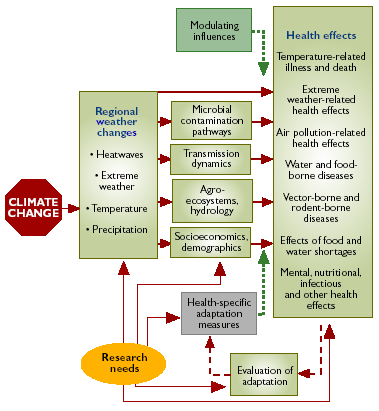We all have heard that climate change is going to raise the oceans (while making them acidic), that it is going to melt the glaciers, and turn some parts of the world into deserts while others flood. But did you also know run away climate change is also going to screw up your body. Thats right. Climate change has a good chance of making you very sick.

The health impact of climate change is a critical issue that policy-makers should be aware of while setting priorities for action and investment to mitigate the impact of global climate change. This is the key message that WHO (World Health Organization) experts delivered at the Climate Change Global Risks, Challenges and Decisions conference in Copenhagen.
Building on research, WHO has identified three key health arguments for stronger climate change measures:
1. Climate change has adverse consequences for health: as carbon goes up health goes down
WHO and the International Panel on Climate Change (IPCC) data identify risks to human health as a serious signal of the consequences of climatic disruption of this planet’s natural processes which we depend on for food, water, and physical safety. Health hazards from climate change are diverse, global and difficult to reverse over human time scales. They range from increased risks of extreme weather events, to effects on infectious disease dynamics and sea level rise leading to salinization of land and water sources.
Based on WHO estimates around 150,000 deaths now occur in low-income countries each year due to climate change from four climate-sensitive health outcomes – crop failure and malnutrition, diarrhoeal disease, malaria and flooding. Almost 85% of these excess deaths are in young children.
2. Reducing green house gases emissions can be beneficial to health: as carbon goes down health goes up
Feasible improvements in environmental conditions could reduce the global disease burden by more than 25%. A large part of the current burden is linked to energy consumption and transport systems. Changing these systems to reduce climate change would have the added benefit of addressing some major public health issues, including outdoor air pollution (800 000 annual global deaths); traffic accidents (1.2 million annual deaths); physical inactivity (1.9 million deaths); and indoor air pollution (1.5 million annual deaths).
3. The health impacts of climate change are felt unequally: effective response requires global action
Whether it’s the 70 000 excess deaths from the heat wave in Europe in 2003, or new malarial deaths in the central African highlands, the people at greatest risk for climate-related health disorders and premature deaths are the poor, the geographically vulnerable, the very young, women and the elderly. The populations considered to be at greatest risk are those living in small island developing states, mountainous regions, water-stressed areas, megacities and coastal areas in developing countries (particularly the large urban agglomerations in delta regions in Asia), and also poor people and those lacking access to health services.
Putting these three health arguments at the center of discussions at the forthcoming Conference of the Parties (COP-15) in Copenhagen later this year would ensure that in the new post-Kyoto agreement we will all share in the health and economic benefits that can accrue from countering climate change.
WHO will work to achieve four objectives: raising global awareness of these health arguments; making the health case for strong greenhouse gas reductions (mitigation) in all sectors (e.g., transport, housing, energy, agriculture) at national, regional and international levels; promoting and supporting the generation of scientific evidence; and strengthening health systems to cope with the health threat posed by climate change, including emergencies related to extreme weather events and sea-level rise.
WHO’s member States have highlighted the importance of action to protect health from climate change. Countries have asked WHO to step up support for national and international efforts assess and address the implications of climate change for health and health systems.